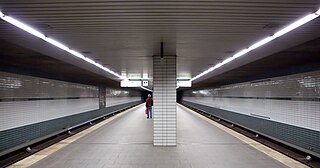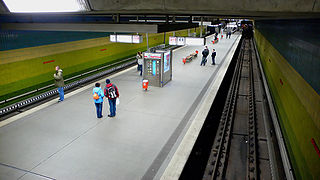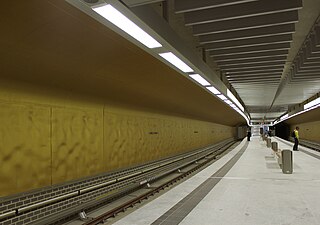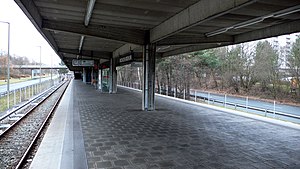
The Nuremberg U-Bahn is a rapid transit system run by Verkehrs-Aktiengesellschaft Nürnberg, which itself is a member of the Verkehrsverbund Großraum Nürnberg. The Nuremberg U-Bahn is Germany's newest metro system, having begun operation in 1972, although the Nuremberg-Fürth route (U1) uses part of the right of way of the Bavarian Ludwig Railway, Germany's first passenger railway opened in 1835. The current network of the U-Bahn is composed of three lines, serving 49 stations, and comprising 38.2 kilometres (23.7 mi) of operational route, making it the shortest of the four metro systems in Germany, behind Berlin, Hamburg and Munich.

Lorenzkirche station is a Nuremberg U-Bahn station, located on the U1 line.

Langwasser Mitte station is a Nuremberg U-Bahn station, located on the U1 line.

Gemeinschaftshaus station is a Nuremberg U-Bahn station, located on the U1 line.

Langwasser Süd station is a Nuremberg U-Bahn station, located on the U1 line.

Schoppershof station is a Nuremberg U-Bahn station, located on the U2.

Rothenburger Straße station is a Nuremberg U-Bahn station, located on the U2 and U3. When traveling in a southerly direction it is the last station to be served by both U2 and U3. The station is connected to the Nürnberg Rothenburgerstraße station of the Nuremberg S-Bahn.

Maxfeld station is a Nuremberg U-Bahn station, located on the U3.

Röthenbach station is a Nuremberg U-Bahn station and is the terminus of the U2 line.

Plärrer station is the only Nuremberg U-Bahn station apart from Nürnberg Hauptbahnhof to have an interchange with all the U-Bahn lines – the U1, U2, and U3. Like Aufseßplatz, Hauptbahnhof and Friedrich Ebert Platz orange tiles indicate its intended use as an interchange station between different subway main lines. The station is named after the Plärrer, long an important interchange of various types of transportation including the site of the Nuremberg terminus for the Bavarian Ludwig Railway. Despite folk etymology linking the name to the local word "plärren" for screaming, it likely derives from Plarre a now disused word for a square.

The Nuremberg S-Bahn is an S-Bahn network covering the region of Nuremberg, Fürth and Erlangen which started operations in 1987 and is now integrated into the Greater Nuremberg Transport Association. The full length of the five current lines is about 277.6 kilometres.
Langwasser is a part (Stadtteil) of Nuremberg in the southeastern area of the city. It was developed as a prototype of the satellite town concept in the 1960s and is primarily a suburban residential area. The name Langwasser, comes from a small stream bordering the area on its eastern edge.

Friedrich-Ebert-Platz station is a Nuremberg U-Bahn station. It was the northern terminus of the U3 line from its opening on 10 December 2011 until 2017, when the extension towards Nordwestring opened. It offers interchange to Tramway line 4. Like Aufseßplatz, Hauptbahnhof and Plärrer orange tiles were used in the walls of this station to indicate a possible future interchange station. However, as of 2021 no such interchange to another subway line is planned for the foreseeable future.

The U1 is an underground line in Nuremberg. The first part of the line was opened on 1 March 1972. It is about 18.5 kilometres (11.5 mi) long and has 27 stations. The termini are Langwasser Süd in the southeast and Fürth Hardhöhe in the northwest. Until 11 December 2016 it shared tracks with the former booster line U11 between Eberhardshof and Messe. Those services are still run but no longer designated U11, instead being signed U1 like trains doing the full Langwasser-Hardhöhe run. Unlike U2 and U3 all trains are operated by a driver and there are no plans to automate U1.

The U3 is an underground line in Nuremberg. The line was opened on 14 June 2008. It is about 9.2 kilometres (5.7 mi) long, making it the shortest in the system. The number of stations is 14. The termini are Nordwestring and Großreuth. U 3 trains are run driverless and have been since the opening of the line. U3 shares part of its route with the older U2. Due to the circuitous horseshoe-shaped route, U3 is not always the fastest public transit option between its stations. For example, the buses that run along B4R are - per the official schedules - faster for getting from Nordwestring to Gustav Adolf Straße and the tramway line 4 is faster for getting from Friedrich Ebert Platz to Plärrer than the respective U3 connection.

The Nuremberg tramway network is a network of tramways forming part of the public transport system in Nuremberg, a city in the federal state of Bavaria, Germany. The system reached the neighboring city of Fürth from its opening year to almost a century later when construction of the U1 subway line led to the withdrawal of tram service to and within Fürth. During that era and referring to it historically in literature or nostalgic activities, the system was known as “Nürnberg-Fürther Straßenbahn“. For example, a local association dedicated to preserving the history and heritage of the tram network as well as old rolling stock calls itself “Freunde der Nürnberg-Fürther Straßenbahn“ The system is planned to cross the municipal boundaries of Nuremberg once more, if and when the extension to Erlangen and from there to Herzogenaurach dubbed "Stadtumlandbahn" opens.

The Nuremberg Ring Railway is the ring railway for freight that runs at a distance of three to four kilometres from the center of Nuremberg in the German state of Bavaria.

Klinikum Nord station is a Nuremberg U-Bahn station which opened on 22 May 2017 and serves the line U3.

Nordostbahnhof station is the 34th underground station of the Nuremberg U-Bahn and was opened on 27 January 1996. It is 902m from Schoppershof underground station and 835m from Herrnhütte underground station. The station is connected to Rottenbach by a sharp track change and a parking and sweeping facility in the direction of the airport up to Herrnhütte underground station. The Nordostbahnhof was opened on 1 February 1908 as part of the Gräfenbergbahn. According to earlier plans, the station was to be called Leipziger Platz.

The VAG Class G1 is an electric multiple unit (EMU) train type operated by the Verkehrs-Aktiengesellschaft Nürnberg on the Nuremberg U-Bahn system. They have replaced the VAG Class DT1 and VAG Class DT2 previously in service on Nuremberg U-Bahn line U1. On 20 August 2020, the first of three G1 trains entered into the revenue service.




















